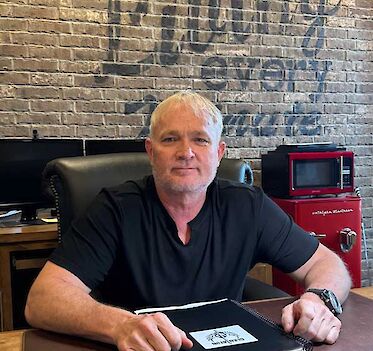A Journey of Resilience, Hope, and the Power of Organ Donation
National Organ Donor Day is a time to reflect on the incredible impact that organ donation can have on people’s lives. For Dr. Tim Reynolds, founder of HealthCARE Express, organ donation wasn’t just an idea—it was a reality that saved his life. His journey from perfect health to kidney failure and, ultimately, a transplant is a powerful reminder of why organ donors are true lifesavers.
A Mysterious Illness That Changed Everything
For most of his life, Dr. Reynolds had been the picture of health. He rarely got sick, had never had major medical issues, and was used to feeling strong and active. That all changed in October 2021, when he started experiencing unexplained abdominal pain, night sweats, and fatigue.
“At first, I thought I had food poisoning,” he recalls. “Then I thought it was a kidney stone, or maybe even a mosquito bite. The symptoms were just weird, and no one could figure out what was wrong.”
The symptoms eventually subsided, but a month later, they returned—this time, even worse. After running some lab tests, Dr. Reynolds was shocked to discover that his kidney function had plummeted.
“My creatinine levels, which measure kidney function, were five times higher than normal,” he explains. “At first, I thought the lab made a mistake. But after repeating the test, it was even worse. That’s when I knew something was seriously wrong.”
A Rare Diagnosis and a Life-Changing Reality
With his kidney function failing rapidly, Dr. Reynolds was hospitalized and diagnosed with Goodpasture’s Disease, a rare autoimmune disorder that attacks the kidneys and lungs.
“Most people with kidney failure go through a slow process—high blood pressure, diabetes, things like that,” he says. “But for me, it happened almost overnight. My kidneys just stopped working.”
Doctors told him he would need dialysis for at least four years before even being considered for a transplant. But that wasn’t an option Dr. Reynolds was willing to accept.
“No way,” he says. “I told them, ‘I’m going to be on dialysis AND on a transplant list at the same time. And I’m going to find a donor.’ They just looked at me like I was crazy.”
Finding a Life-Saving Donor
Determined to beat the odds, Dr. Reynolds and his family spread the word that he needed a kidney donor. Incredibly, 37 people came forward, willing to donate.
“The team at Mayo Clinic said they had never seen that many donors for one person,” he recalls. “It was overwhelming and humbling to see so many people step up.”
Ultimately, his longtime friend and fellow Green Beret, Kevin, was a perfect match.
“He called me up and said, ‘I hear you need a kidney. I got an extra,’” Dr. Reynolds recalls. “It was a powerful moment. He said donating felt like a spiritual calling, like I still had things to give to the world, and he wanted to help make that possible.”
In July 2022, the transplant took place. However, complications arose during surgery, and an emergency procedure was needed to save both Dr. Reynolds’ life and the new kidney.
“I woke up thinking everything was great,” he remembers. “Then suddenly, they’re rushing me back into surgery. The kidney was filling up with blood, but it wasn’t draining. I ended up needing four surgeons and cadaver veins to fix it.”
Despite the setback, the kidney ultimately stabilized. Dr. Reynolds faced months of rehabilitation, including learning to walk again after nerve damage from the surgery.
“I spent six months working every day to get back to full strength,” he says. “Now, two and a half years later, I’m back at work, exercising daily, and living a healthy life.”
Why Organ Donation Matters
Dr. Reynolds’ story is a powerful example of how organ donation saves lives—not just for recipients, but also for donors.
“Kevin told me that donating my kidney changed his life, too,” he says. “It was something he felt called to do, and he said it was one of the most meaningful things he had ever done.”
Many people don’t realize that one organ donor can save up to eight lives. In addition, living donors can donate a kidney, a portion of their liver, or even bone marrow to someone in need.
Dr. Reynolds urges everyone to consider becoming a donor.
“If you’re healthy, donate blood. If you want to change a life, think about kidney donation,” he says. “And if you can’t donate, support those who do—because for someone out there, it could mean everything.”
Be a Hero: Register as an Organ Donor
Becoming an organ and tissue donor is a generous act that can save and enhance many lives. Here are some resources to guide you through the process:
Register as a Donor: Visit the National Donate Life Registry at RegisterMe.org to register your decision to be an organ, eye, and tissue donor. This ensures your wishes are documented and honored nationwide.
Learn About Donation: The U.S. government's official website, OrganDonor.gov, provides comprehensive information about organ, eye, and tissue donation, including the donation process and answers to frequently asked questions.
State-Specific Information: For details specific to Texas, including how to register through the Department of Motor Vehicles, visit the Donate Life Texas website.
Living Donation: If you're considering becoming a living donor, OrganDonor.gov offers insights into the process, benefits, and considerations of living organ donation.
Support and Advocacy: Organizations like Donate Life America provide resources, stories, and opportunities to get involved in promoting organ and tissue donation.
By exploring these resources, you can make an informed decision about becoming an organ and tissue donor and take the necessary steps to register your choice.
